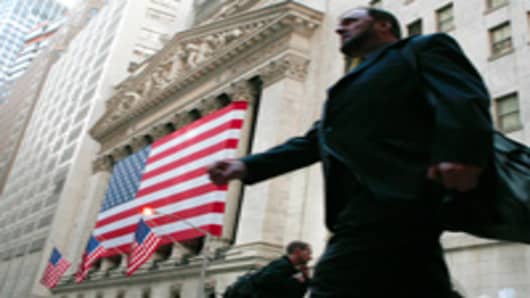Headlines on jobless claims and the Philadelphia Fed survey compete with a rush of earnings news Thursday.
Stocks stormed higher Wednesday, erasing much of Tuesday's losses, as the dollar turned weaker and commodities popped once more on the promise of more Fed easing.
"The tide went out yesterday and came back in today," said Art Cashin, director of floor operations at UBS. "...Somebody could blindfold you and all you'd have to say is what's the dollar doing to know where the stock market's going."
The dollarlost 1.6 percent against the euro to $1.3949, and it was down 0.5 percent against the yen. The Dow lost 129 points, or 1.2 percent, to 11,107, and the S&P 500 rose 12, or 1 percent, to 1178. Crude rebounded by almost 3 percent to $81.77 per barrel. Gold rose 0.5 percent to $1,343.30 per troy ounce.
Barclay's Capital commodities analyst Suki Cooper said gold should continue its path upward for now, after Tuesday's sell off. "I don't think the longer term themes have been dented. We wouldn't rule out pullbacks but longer term, medium term, we could see new highs," she said.
"As soon as we head out of November, I think we should see some corrections in price, but they will be short lived," she said.
What to Watch
On Thursday, investors will be watching overnight GDP and industrial production data from China. The country's economic growth slowed to 9.6 percent in the third quarter from a year earlier, down from 10.3 percent in the second quarter. Analysts had expected a 9.5 percent pace.
Inflation rose in September to 3.6 percent, reaching a 23-month high and smack in line with forecasts. But industrial output — a key indicator of growth momentum -- increased 13.3 percent year on year, missing forecasts of a 13.6 percent rise.
Markets will also be watching the U.S. weekly jobless claims number, released at 8:30 a.m. Economists expect 455,000 claims. The Philadelphia Fed survey, released at 10 a.m., is expected to show an increase of 0.2, compared to last month's decline of 0.7 percent. Leading Indicators are also released at 10 a.m.
Earnings are expected from Caterpillar, AT&T, McDonald's, Travelers, UPS, Union Pacific, ITT Educational Services, Southwest Airlines, United Continental Holdings, VF Corp, JetBlue,SunTrust and PNC, ahead of the open. American Express,Amazon.com, Chubb and Chipotle Mexican Grillreport after the bell, as does Sandisk and Citrix.
As of Wednesday, 101 S&P 500 firms reported earnings and 83 percent beat estimates for earnings per share. Sixty-one percent beat revenue expectations.
Airlines did especially well Wednesday. Delta was up 11 percent, and AMR jumped nearly 13 percent after it reported its first profit in two years. Delta predicted its first profitable fourth quarter in years, after releasing news of a profitable third quarter. US Airways CEO Doug Parker said the quarter was a watershed for the whole industry, which has made significant cuts in capacity over the past several years.
Some traders expected Tuesday's stock market sell off to carry over, but the market Wednesday once more latched on to the idea of Fed easing and pushed higher. The materials sector was the best performing, up 2 percent, and financials were up more than 1 percent, after taking another beating Tuesday on concerns about the industry's liability on mortgages.
Legg Mason's Bill Miller said it's time to bet on stocks and that they have not been this undervalued since the early 1980s. "I'd be surprised if the market isn't up 20 percent in the next 12 months," Miller said on "Squawk Box" Tuesday morning.
Miller gained fame when he beat the stock market for 15 consecutive years, until 2005. Investors left his Legg Mason Value Trust fund after it landed at the bottom of the rankings for several years before making a comeback with a 40.6 percent return in 2009. The fund was up 9.9 percent in September, but down just under 1 percent year-to-date. Miller said he tends to do better when in market's like this, where stocks are undervalued and unloved.
"The Fed is going to put more liquidity into the economy. The monetary base is going to grow as a result of that, but stocks are just incredibly cheap as opposed to bonds. And inflation is effectively 0-1 percent, and so you have free cash flow yields of the overall stock market right now around 7 percent and about a third of the stock market has free flow yield of about 10 percent and with people trying to buy Treasurys at 2.5 that is just incredibly attractive," he said.
The Fed's beige book release Wednesday affirmed the case for more Fed easing, widely expected to be adopted by the Fed after it meets Nov. 3. But the report did not show graver concerns about the economy. "I laughed when I saw the tan book. It wasn't that bad," said Cashin.
He did note that despite the market's positive reaction to the the idea of quantitative easing from the Fed, there is growing concern about it. "The skeptics about QE2 are growing by the minute, either in it not being effective or not a good thing," he said. The Fed is expected to buy Treasury securities when it restarts its program, which in theory would add money to the system, reflating assets, and keep downward pressure on lending rates.
Fed speakers have been abundant this week, and two more are expected Thursday. St. Louis Fed President James Bullard speaks at 9:45 a..m. and Kansas City Fed President Thomas Hoenig, speaks at 9:45 p.m.
- Follow me on Twitter @pattidomm.
Questions? Comments? Email us at marketinsider@cnbc.com



